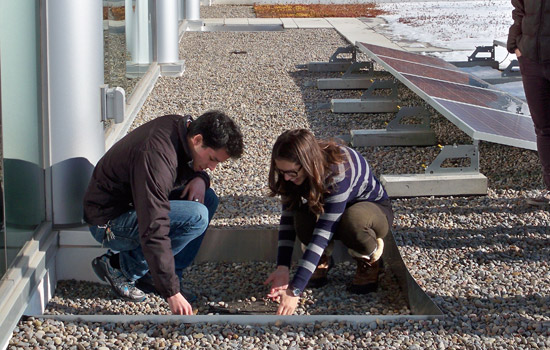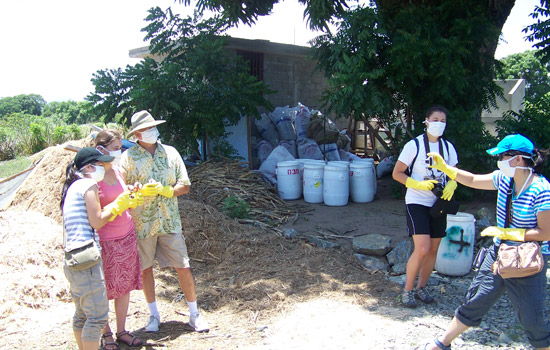Two RIT research teams awarded EPA grants
Engineering and sustainability research focuses on collaborative solutions for the environment
Engineering students and faculty have traveled on several occasions to Haiti to learn about, and provide support for, sustainable environmental projects, including a trip to the SOIL waste compost site in Limonade, Haiti, in 2012. They will continue research and development of a sanitation project, funded by a recent grant award from the EPA’s People, Prosperity and the Planet initiative. From left, Darinee Narimarnkarm, Sarah Bownell, Brian Thorn, Kim Hunt and Shwe Sin Win.
Rochester Institute of Technology recently received two Environmental Protection Agency grants to support projects to develop solutions to real-world environmental challenges. Faculty and student researchers in RIT’s Kate Gleason College of Engineering and the Golisano Institute for Sustainability were each awarded $15,000 through the 2013 EPA’s People, Prosperity and the Planet phase I grant program.
The grant program, now in its 10th year, provides incremental funding for collegiate teams to design and develop environmental solutions. Projects are later featured at the National Sustainable Design Expo, held yearly in Washington, D.C. Teams compete for additional grant funding to further develop the projects.
RIT’s first award was given for the project “The development of an improved ‘Arborloo’ to promote sanitation in rural environments.” The team, led by Brian Thorn and Sarah Brownell, both faculty members in the Kate Gleason College of Engineering, will design a simple, inexpensive toilet that can be easily installed in remote locations and built using local labor and materials to provide an entrepreneurial opportunity within the community. The arborloo could help to improve conditions where nearly half the people living in developing regions lack proper sanitation, and high rates of child deaths result from poor sanitation and unsafe drinking water.
The second project, “Implementing Practical Pico-hydropower,” will support campus sustainability initiatives through a feasibility study of implementing a micro-hydropower system within RIT’s Golisano Institute for Sustainability building. The work is led by Gabrielle Gaustad, assistant professor in the institute, along with Matt Burke, Kate Kruger, J.D. Harper, Bridget Carney, Adam Stoke and Sergey Selyuzhitskiy, all graduate students in RIT’s architecture program. The team will test a micro-hydropower unit in the lab, use data from the tests to determine an efficient implementation design, and quantify the economic and environmental impacts. The team will also propose a second phase to integrate the unit into the current rainwater collection and storage infrastructure present in the building.
This year’s EPA People, Prosperity and the Planet teams come from 34 universities in 26 states. Projects focus on a variety of environmental and health-related areas including sustainable water treatment options, health monitoring devices and biodegradable food packaging alternatives, for example.
RIT has been recognized in the past by the EPA for 11 faculty-student research projects, including a first place award and $75,000 grant for the design of a low-cost solar oven for use in developing countries, and an honorable mention for the project to build a scalable, low-impact, river hydropower generator.
 Matt Burke and J.D. Harper, both graduate architecture students, were part of the research team that received an EPA People, Prosperity and the Planet grants. The students examine one of the rainwater collection drains on the green roof of RIT’s Golisano Institute for Sustainability.
Matt Burke and J.D. Harper, both graduate architecture students, were part of the research team that received an EPA People, Prosperity and the Planet grants. The students examine one of the rainwater collection drains on the green roof of RIT’s Golisano Institute for Sustainability.





